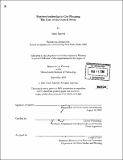| dc.contributor.advisor | Dennis Frenchman. | en_US |
| dc.contributor.author | Agarwal, Anjali, M.C.P. Massachusetts Institute of Technology | en_US |
| dc.contributor.other | Massachusetts Institute of Technology. Dept. of Urban Studies and Planning. | en_US |
| dc.coverage.spatial | n-us-ma | en_US |
| dc.date.accessioned | 2006-09-28T15:15:11Z | |
| dc.date.available | 2006-09-28T15:15:11Z | |
| dc.date.copyright | 2005 | en_US |
| dc.date.issued | 2005 | en_US |
| dc.identifier.uri | http://hdl.handle.net/1721.1/34177 | |
| dc.description | Thesis (M.C.P.)--Massachusetts Institute of Technology, Dept. of Urban Studies and Planning, 2005. | en_US |
| dc.description | Includes bibliographical references (leaves [91]-[97]). | en_US |
| dc.description.abstract | This thesis has been motivated by my interest in the Artery Business Committee (ABC), which was formed in 1989 with a mission to collectively represent the business community's interests in the fear and opportunity presented by the Central Artery Project in Boston. ABC's objectives were to ensure access to the downtown business district during the project and to market the city of Boston as a place to visit, do business in and invest in. This example of ABC presents an interesting paradigm in city planning where business groups recognize their relationship and role in planning for the city future. The same trend can also be found in several other cities. Two leading examples, which have been chosen for detail study, are the Commercial Club of Chicago and the Central Houston Inc. Both the business led civic groups have an agenda similar to that of ABC and promote a better future for their cities. Owing to their efforts, both the business groups now hold a strategic position of influence in their city's planning process and decision-making. Their study offers several important lessons, which can further be used as criteria to judge ABC's role in the planning of the Central Artery Project in Boston. | en_US |
| dc.description.abstract | (cont.) In 2005, as the Central Artery project nears completion, ABC aims to continue their participation in the planning of Boston and further its objective of economic development and enhanced competitiveness for the city. Through the study of other case examples and a detailed analysis of ABC, the thesis attempts to put forward recommendations for ABC's transformation into its second phase of civic participation. Furthermore, these recommendations can be used as a generic set of tools for a business-backed organization to participate in city planning and development and leverage change. | en_US |
| dc.description.statementofresponsibility | by Anjali Agarwal. | en_US |
| dc.format.extent | 77, [20] leaves | en_US |
| dc.format.extent | 5396353 bytes | |
| dc.format.extent | 5400372 bytes | |
| dc.format.mimetype | application/pdf | |
| dc.format.mimetype | application/pdf | |
| dc.language.iso | eng | en_US |
| dc.publisher | Massachusetts Institute of Technology | en_US |
| dc.rights | M.I.T. theses are protected by copyright. They may be viewed from this source for any purpose, but reproduction or distribution in any format is prohibited without written permission. See provided URL for inquiries about permission. | en_US |
| dc.rights.uri | http://dspace.mit.edu/handle/1721.1/7582 | |
| dc.subject | Urban Studies and Planning. | en_US |
| dc.title | Business leadership in city planning : the case of the Central Artery | en_US |
| dc.type | Thesis | en_US |
| dc.description.degree | M.C.P. | en_US |
| dc.contributor.department | Massachusetts Institute of Technology. Department of Urban Studies and Planning | |
| dc.identifier.oclc | 69408924 | en_US |
